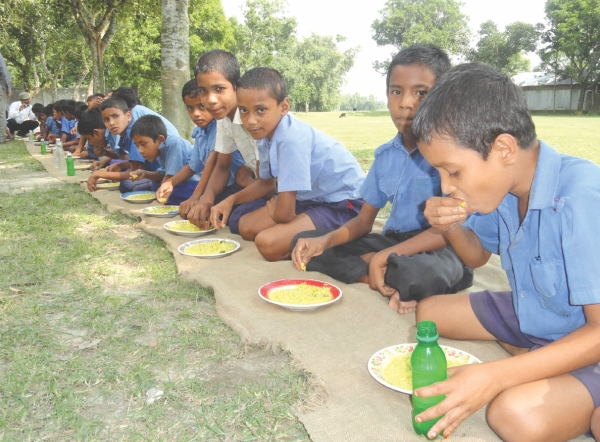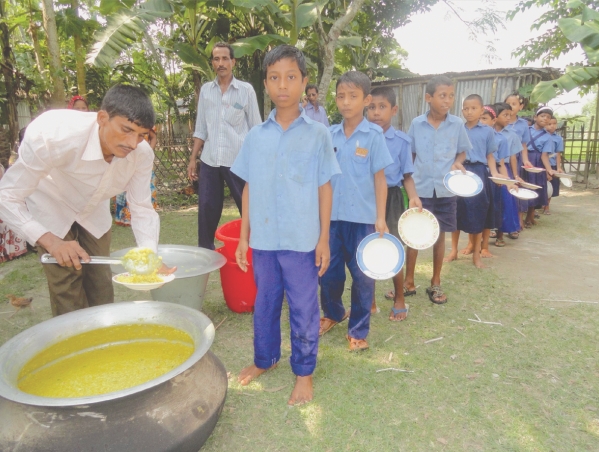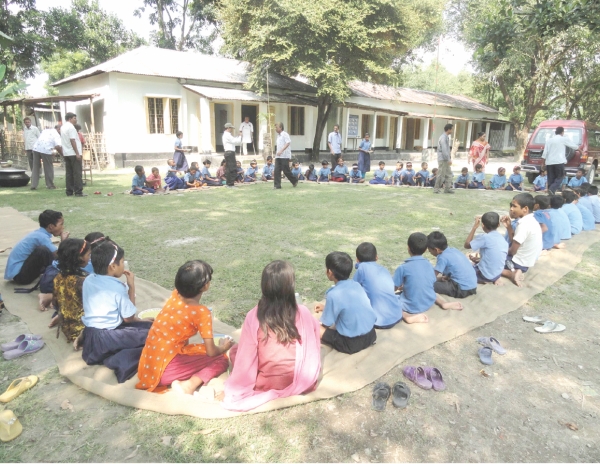Cover Story

Curbing Dropout:
Midday Meals at Primary Schools
Bangladesh has done well in improving the state of education throughout the country. As of 2008, UNDP reports the nation-wide enrolment rate at the primary level to be at 91.9%, an astounding figure when one considers the base rate of 60.5% (1991). But the dropout rate remains high as well, as a result of which the proportion of students starting Grade 1 who reach Grade 5 is only 54.9%. This fortnight's Star Insight brings to light a recent midday meal initiative at primary schools of Bangladesh, one which has the potential to significantly reduce dropout rates and, in the process, make it possible to reach the second Millenium Development Goal: Achieving Universal Primary Education.
......................................................................
S Dilip Roy
Mobarok Hoosain, a class three dropout of South Goddimari Government Primary School at Hatibandha upazila in Lalmonirhat district, was seen to attend school on a regular basis once again. Like Mobarok, 20 other dropouts from class three, four and five of the school are now attending classes regularly and attentively because the school now offers midday meals to its students.
A total of 2500 students ranging from classes three to five at 21 govt primary schools at two Upazilas: Hatibandha and Patgram get midday meal facilities. Each student is served with 150 gram of Khichuri as midday meal at a cost of Tk. 6/- every week. The meals are provided for five days every week (Saturday to Wednesday). At this subsidised rate, poor families are becoming eager in sending their children to school as it takes off a huge burden off of their backs. This initiative has given such parents a respite from being tensed all of the time as to how to provide at least one square meal for their child every day.

Students make a queue for the meal
Shofiqul Islam, the headmaster of South Goddimari Government Primary School says, “Both students and their guardians have become conscious about education after starting the midday meal program at the school. Guardians are now always eager to send their children to school regularly, and students are now prepared to stay in the school from start to end on a regular basis. Before starting the program in my school on July 4 this year, only 75 to 80 percent students were attending classes, but now it has increased to 100 percent.”
It had become a common trend for students to play 'hooky' right after the tiffin period, as hunger took over their minds rendering them inattentive in class. Since the inception of the great initiative, the attendance rate has gone up to 100 percent from the previous as low as 75. The children are now more attentive in class and eager to attend school everyday due to the fact that they are getting a sure chance of consuming at least one full meal on every given school day.

It was gathered from local sources that the program was first proposed by the State Minister for Mass and Primary Education, Motahar Hossain, in the last week of June this year. Conscious guardians and teachers had received the opinion very heartily and had taken up initiatives to start the program immediately. Under the minister's guidance, it was launched on July 4, 2011 in 12 primary schools under the Hatibandha Upazila, and 9 from the Patgram Upazila. The Hatibandha Upazila Nirbahi Officer (UNO) Ashrafuzzaman says the educational atmosphere at these schools have improved drastically following the midday meal programme.
Paikertari Govt primary school headmaster Abu Bakkor Siddique says, “Now the students have discarded their attitude to evade classes and their presence is 100 percent. This has been made possible only because of the midday meal program. Before the program, many students from poor families faced hunger during lunch period, but they had no scope to a proper meal resulting in inattentiveness in lessons.”
School sources say that the rice comes from the Government Relief Fund, while the pulse, vegetables and spices are received as donations from the guardians and well off people from the area. Each guardian of classes three to five students is expected to pay Tk. 10/- on a monthly basis as donation to purchase the necessities. On top of that, mothers of the children volunteer in groups of four to cook and distribute the food every day. This is truly an unique initiative, one which brings together the collaboration of the state, the school and the guardians of the students.

Students having their midday meal
The Hatibandha Upazila Primary Education Officer, Rofik Uz-zaman, says that students and guardians of the 21 schools are observing very positive outputs from the midday meal program. “It really plays a vital role in reducing dropout rates, and provides the much needed educational atmosphere among teachers-students and guardians alike.”
The Lalmonirhat district primary monitoring officer, Abu Bakor Siddik, says, “The 75 percent students enjoying government stipend were regular in the school while rest of the 25 percent of students were irregular or constantly dropping out. Now 100 percent students attend at the 21 schools at Hatibandha and Patgram upazila after launching the midday meal program.”
There are 666 primary schools including 306 government based schools registered in five Upazilas under the Lalmonirhat District. Locals are urging the government to take up this initiative as their own and to launch it in all the remaining schools in Lalmonirhat to ensure more student turnout at the primary levels.
The Lalmonirhat district primary education officer Nobez Uddin Sarker said, “The midday meal program launched at the 21 schools of the two Upazilas in Lalmonirhat District has brought unexpected success in just three months! We are trying to launch the program in the remaining three Upazilas, if we get positive response from the government.”
Cover Art by by Ujjal Ghose
..........................................................................................................................
What do the students feel?
Khadiza Akhter, Class Four, Pikertari Government Primary School at Hatibandha Upazila: Many, including me, would not attend school before this was introduced. But, all of that has changed ever since the midday meal program was introduced. We never miss school now.
Hamidul Islam, Class Four, South Goddimari Government Primary School: I come from a poor family where the sole provider is my father, Jasor Ali. He is a day labour who earns around Tk. 120/- to Tk. 140/- daily, which is nearly not even enough to support the 5 family members living under one roof. I used to be irregular in attending classes even three months back, as I was not ensured one proper meal every day at home. But, I am now a regular student, as this program has helped in taking away one piece of huge tension from my parents of feeding me at least once a day.
Khushi Akhter, Class Five, Paikertari Government Primary School at Hatibandha Upazila: The Khichuri given to us everyday is very rich in nutrition, because of the ample amount of pulse, and vegetables used in preparing it. Providing us with the meal helps us tame our hunger, and also brings back our level of concentration so that we are more attentive in class.
The guardians' responses:
Hosne Ara Begum, Mother of a Student at Paikertari Government Primary School: The program has enabled our children to be more attentive in class, and hence giving them a better opportunity in pursuing an education.
Hasi Begum, Mother of a Student at Paikertari Government Primary School: The program has not only affected the students, but the guardians as well. Many of the mothers are seen to volunteer to cook and distribute the food everyday to show support and better the education for their children.
Guardians Dina Begum, Roksana Begum, Swopna Begum, Nazma Begum and others of South Goddimari Government Primary School: The midday meal program really brings a better primary education policy. It makes school important to the children. The programme should be continued for a stronger primary education base.
Copyright
(R) thedailystar.net 2011 |




